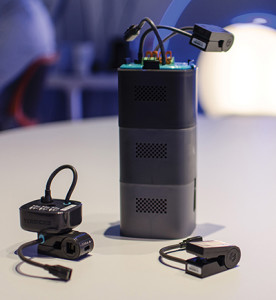SAN FRANCISCO—One of the best benefits of adding technology to hotels is the ability to gain insight through new kinds of data. But it’s not enough to accumulate the information; in order to make the most of what’s available, that data has to be actionable, whether the technology is focused on revenue management, housekeeping or energy management.
“Usually, energy is one of the most expensive line items for the operating side of a hotel. Most of the time, the challenges that facilities managers face is not knowing how to tackle reducing that cost item. They might try outsourcing laundry or rescheduling machines, replacing lights, but most of the time, they’re stabbing in the dark. There are various solutions available that let you see a lot more about where your energy is going,” said Mark Chung, CEO of Verdigris, which makes one of those solutions—ultra-sensitive, high-frequency sensors that attach onto a building’s circuit panel to collect energy-use data.
Chung highlighted that it’s not just an expense problem, but a revenue and reputation one. “Any time a hotel has a problem that impacts a guest, that really affects [online]ratings,” he said. And, as everyone in the industry knows, bad reviews on websites and social media affect how aggressively hotels can push rate. “Hotels are constantly trying to figure out how to know ahead of time if it’s going to break or if there’s a problem. We’ve heard some horror stories,” said Chung, recalling a high-end property that had an HVAC system that failed. While that’s enough of a headache for a hotel operator, the system failure triggered the fire alarm—at 3 a.m. in the morning.
Verdigris’ system employs an artificial intelligence (AI) platform designed to help hotels reduce costs and avoid problems like the one Chung described. “We’re basically an energy-monitoring system, but very sophisticated,” said Chung. “The way we touch the hotel is we put magnetic sensors around the electric panel of the building, which are all connected to a 4g Verizon network. We send information from those sensors back to our software and it analyzes all the data.” This analysis is both large scale and small, with the ability to break the data down to a single appliance that’s wasting energy or acting strangely—even down to a single iPhone charger, according to the company.
“We can detect what kind of equipment is inside the building at various levels, we can predict when it will be utilized or when it will fail, and then we provide that back as a software as a service (SaaS) to the hotel client,” said Chung, noting that properties receive real-time alerts and reports on equipment failure. The platform can also integrate with other systems to automate the fluctuation of the mechanical systems, such as pre-cooling the building and setting temperatures down.
Juan Bueno, GM of Orchard Hotel, a LEED-certified boutique hotel here, cited a desire for knowledge as the reason the hotel teamed up with Verdigris.
“We decided to partner with Verdigris mainly due to our staffing levels and, at the time, our maintenance team’s strength,” he explained. “We had a team of four individuals, but only one was adequate for the position—this made me nervous and Verdigris could offer instantaneous information should any issues arise. This helped address items in a more timely manner and with better knowledge of what the issues may be.”
Citing the real-time updates and the ability to receive data on a granular level as the most beneficial component of the system, Bueno said, “We have been alerted of pumps that have failed or ceased to work, of fans that stopped operating and of spikes in energy use by certain pieces of equipment.” He noted that the cost of these finds aren’t easily measurable but “if these failures would have gone unnoticed, it may have resulted in losses for the business, as well as guest satisfaction.”
“We also provide reports that summarize how to save energy for the building,” said Chung, noting that what type of information hotels are looking for vary by property. “Some of the needs change depending on clients. Hyatt, Marriott, etc., all have slightly different requirements. Most of them will look for a weekly or monthly report that will generate where they’re spending their electricity and what recommendations we would have to shifting that utilization. We also show them how much money we’re saving them when we do an integration. And, there are people within those hotels—the sustainability folks—who want to know how well their hotels are performing, and we can generate carbon reports to show how much carbon reduction the hotel has done.”
According to Chung, hotels can see anywhere from 8-22% energy reduction, “which can be quite a significant chunk of their utility costs.” However, he said, there are some types of properties where the value of the integration is more prominent. “That’s the very large, single footprint, central mechanical-style hotel where guestrooms are connected through hallways. Villa-style hotels, where it’s spread out more, tend to have less centralized equipment,” he said, noting that these properties can still save a considerable amount of money, but they have to deploy more sensors.
Looking to the future, Bueno called technology like this “tremendously important” to the industry. “Everyone should be trying to monitor and decrease their consumption, as well as keep equipment working in optimum conditions,” he said. “Any failure of equipment can be extremely expensive, and unnecessary at times should a system like this not be used.”
One thing that excites Chung about AI innovations in hotels is the possibility of opening up new locations to hotels. “The idea that you could tie an artificial intelligence like ours to a micro grid that allows the hotel to operate in a remote location with low infrastructure will expand hospitality to all sorts of exotic locations where you get the comforts of home but in very remote destinations,” he said. HB


